While at Artwalk Alpine, I was convinced not to be scared of Border Patrol checkpoints (think pounds and pounds of green leafy material – i.e. tea), and that Terlingua and Big Bend National Park were both places worth going. So, after a couple days of rest and recuperation, I drove southward. My only connection was a friend of a friend named Trevor Reichman. An on-the-road musician for much of the time, Trevor has been slowly building his little homestead out in the middle of the desert of Terlingua Ranch. He shared with me his cob dome, his solar electric setup, his little sheds, dogs, and beautiful desert land. He suggested I go to “the ghost town,” as the locals call downtown Terlingua for Burger Night at the Starlight Theatre.
Terlingua is a historic mercury-mining ghost town of stone and adobe ruins, dusty roads, old rusty cars and machinery, and an amazingly re-envisioned community of musicians, alcoholics, river rats, tourists, old school buses and trailers, off-grid living, and houses that incorporate the ruins. Property is cheap, which makes taxes cheap, which makes no room for building inspectors, which makes for incredible opportunity to build how you want. In the afternoons and evenings, locals and tourists alike gather on “The Porch” to play music, drink, and hang. The Porch is great, big, and long and spans across a couple local businesses. “Out here we watch the sunset in the east,” is a phrase that’s thrown about. My friend, Chase (who is writing his dissertation on music of Terlingua), says this is both literal in the sense that people sit on “The Porch,” face the east, and watch the awe-inspiring Chisos Mountain turn orange and pink as the sun goes down. He says it’s also symbolic in that what they’re really saying is they do things differently out here.
On Burger Night, I met a couple folks, served a little tea, and Trevor bought me a burger. People were nice enough, and I decided to spend the whole next day serving tea right there in the heart of the ghost town. I parked in the parking lot overnight, and the next day I opened for business. I had a great parking spot that over-looked the main area of the ghost town, so I figured I would get lots of folks. The day turned out slow, so I spent time picking up recycling, clearing some rocks so I could put out a rug, and making a little stone outline of a patio. The few folks who stopped by were nice, but it was real slow. Then a woman who I had been warned about showed up. “I’m the property manager for the ghost town. It’s all private property. You can’t camp here.” She came across harsh, but not as harsh as others had made her out to be. She didn’t say anything about serving tea though. Three hours passed and not a single person showed, despite the more-than-normal amount of people in town for Thanksgiving week.
A local bartender, who I met earlier, stopped by again. “So, are you going to stick around Terlingua?” By the way he asked, I could tell that he hoped I would. “You know, some towns just suck me right in and I feel welcomed, and, well, other places don’t really seem like they want my services. And this seems like one of those towns, so…” He was a little thrown off, but said, “You know, sometimes it’s not about what you give to a place, but what a place gives to you.” At first, this felt like a direct blow to my philosophy that too many travelers are takers, and that my goal was to be a giver. But, the more I thought about it, I heard my close friends who are always telling me that I am too often too stubborn to receive, despite my philosophy that giving paves the way for receiving and vice-versa.
I had agreed to go back to Trevor’s place the next day to lend a hand at building his composting outhouse with him and his friend, Justin. I had been put off by the ghost town at my first visit, and needed this time to figure out what the purpose of my journey south to these parts was about, and if I would stay for a bit. Spending the next day and a half working on Trevor’s outhouse proved to be the perfect place to be. I happened to have some tools they needed, and the job went much faster with three people. Our interaction was wonderful – sharing food, land, work, and play – a great example of non-calculated exchange. If you’ve been keeping up with some of the tea bus’ philosophy of human interaction, this was a nice, smooth example of it.
Thanksgiving came, and we all headed back down to the ghost town. Trevor was playing, Justin bought my Thanksgiving dinner, and I served tea outside. “Just so you folks who bought a Thanksgiving dinner know, you get a free cuppa tea outside with my buddy Guisepi in the tea bus.” Trevor’s humorous tea bus advertisement while he was performing, as well as my parking job (right in the heart of everything), brought a bunch of wonderful folks out for tea. The evening was turning out excellent. I began to feel a little less like I wanted to leave.
The next morning I got a message from Trevor asking if I wanted to work with a fellow named Frank on a straw bale house in the heart of the ghost town. Yes! I headed over there to find a sixty-something fellow working on some structural parts of the porch roof. I think his peek into the tea bus brought an instant interest from his part. And my look at the skeleton of the soon-to-be straw-baled house sparked mine. It turns out that along with being a fine musician, Frank was a pioneer in straw-bale construction. After a day of work, he asked me to stick around a week – and I did.
On the weekends I was serving tea at the local farmers market (across the street from where I was working). I even gave in to the local drinking culture and had a few drinks at the local bars. But, to my surprise, people left and right were buying my drinks and my meals. I was invited to raft the Rio Grande with ten other folks and graciously accepted. I was brought on a hike up to Rancharia Falls in Big Bend State Park by a new friend. All of a sudden, I realized that I really was receiving gifts from Terlingua – I was learning new skills from a great teacher, working my body in the warm sunshine, given a great central place to park Edna, brought on all sort of adventures, bought food and drink (even the district attorney bought me dinner), and getting paid money. I really felt like the bartender’s words were true. And like this, I lived for three weeks in Terlingua.
In the last week I spent three days backcountry camping in Edna and exploring Big Bend National Park from the hot springs to the basin to Lost Mine Trail. I awoke one morning and took a sunrise hike to Santa Elena Canyon. This spectacular canyon arises out of nothing, and it’s sheer 1,000-foot cliffs line the Rio Grande on both side. Here you have Mexico on one side and the United States on the other. I hiked as far as you can up the canyon (1/4 mile) and enjoyed the trail devoid of other humans. The echo was spectacular and the canyon incomparable to any other I have been in. I made my way back to the parking lot and opened up shop to serve tea to any visitors who might show. Several folks stopped for tea.
At one point a couple came out of the canyon and told me there was several armed Mexican military across the river. I went for a look for myself, and sure enough, there was six or eight camouflaged men with assault rifles. I hiked a bit and watched them pose for photos at the mouth of the canyon. I discreetly took my own photo of them. They yelled across to me, “Hablas Español?” “Un poquito.” That was about the depth of our conversation. I wish I had a way to invite them over the river for tea (you could probably wade across it here). As I left and walked through the shrubbery back to the parking lot, I heard a gun shot, and then another. Other tourists became nervous; and more who showed up decided not to hike after I told them. I called the park headquarters and reported the gunshots. “Were they firing across the border?” “I dunno.” They patched me through to Border Patrol. “We’ll call our liaisons across the border and see what’s happening.” I continued to serve tea, not acting on my natural curiosity to head back through the bushes to see what was going on across the river. More folks came, but a third gunshot echoing up the canyon scared them off. It seemed to me that no matter where they were firing in that canyon, whether it was into the river, up in the air, or towards the ground, there was a high likelihood of at least one of the bullets ricocheting and reaching the US side of the border. To my surprise, Border Patrol never showed up to see what was going on, or to warn people not to hike. Eventually, some brave visitors walked to the river (with me in the rear) to discover the military gone. We loaded their canoe in, and all resumed to normal. Talking about this later with folks, many said this kind of thing is somewhat normal, while others acted surprised. Perhaps they were posturing, perhaps they were having fun, perhaps they were shooting rabbits, but I’ll never know.
Throughout my stay in Texas, I’ve continued to be tricked by stereotypes, whether it’s a woman in a cowboy hat talking about taking time on solstice to put your hands on the dirt and connect with the earth, to someone with a deep Texas accent talking about rainwater catchment and solar power. I think this journey around this continent will ultimately break all stereotypes for me, and hopefully some of you reading this. Of course, many of us fall somewhat into stereotypes, but none of us do completely. I’ve found some beautiful people here in Texas, but it sure does mess with the ideas we’ve been taught about Texans, or that there’s two kinds of people in this country (liberals and conservatives).
Here’s to finding friends in new places!
Oh, and check out this 5 part interview series done by Pat O’Bryan of TerlinguaMusic.com.
This is part 1. See all five parts and a blog entry here.
Because of this video, as well as it being a small town, I began to get people saying hi to me that I had never met. The property manager apologized for coming across harsh when I ran into her again. At the store at Terlingua Ranch Rd, I walked in and the cashier said something like, “Hi, Guisepi! I really like the philosophy you live by.” I had never met her before.
Thank you so much to Trevor and Justin, Frank and Elena, David and Kay, Pat and Betsy, Cory and Evyn, Shannon, Sandi and Topher, Gary, George, Chase, Jim and Anna, Shand, Collie, Tara, Manu and Kerri, Lizette, and so many more!


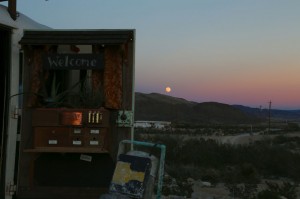

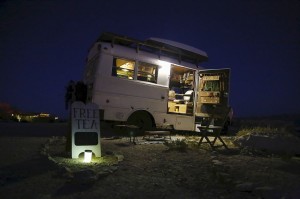
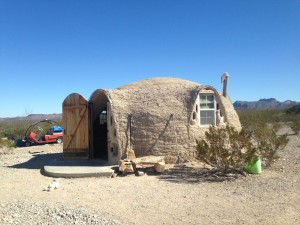

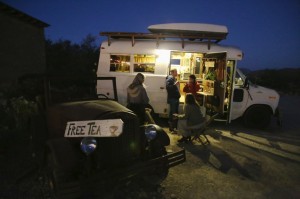
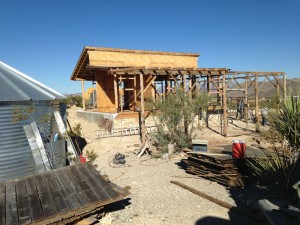
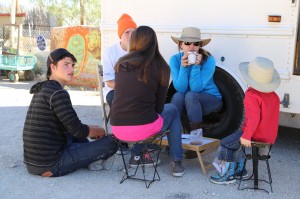

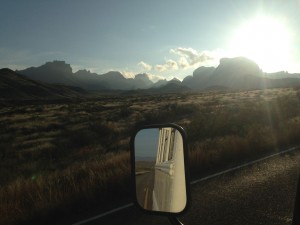
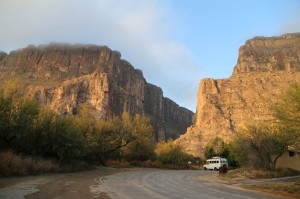
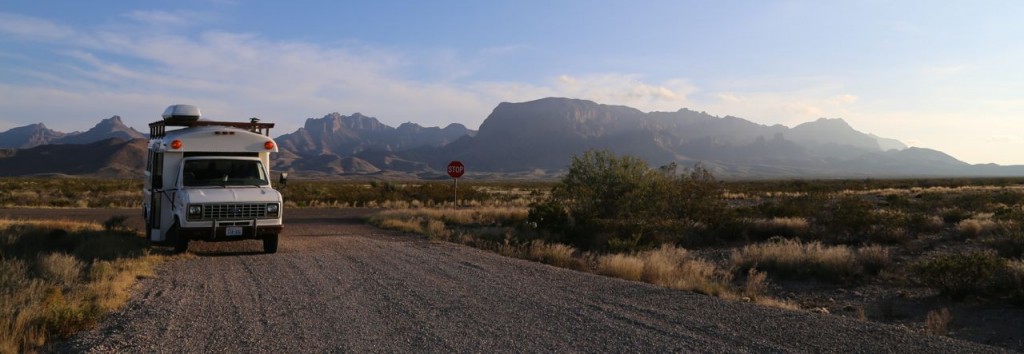
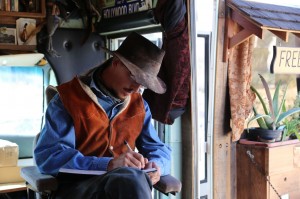
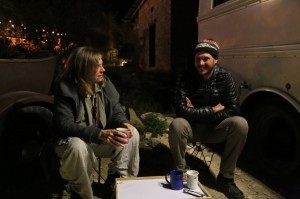
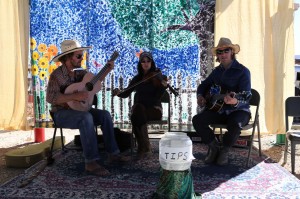

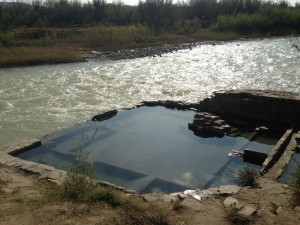

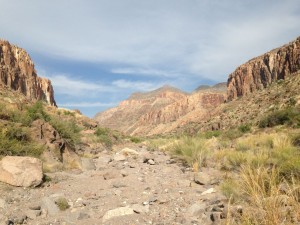

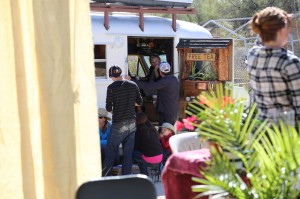
Pingback: Thankful in Floyd, VA | Free Tea Party